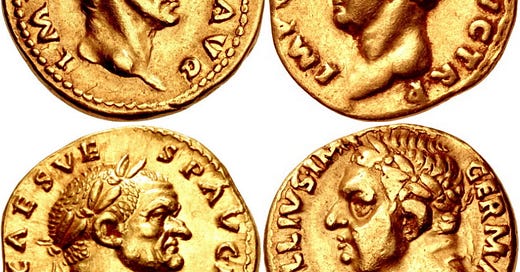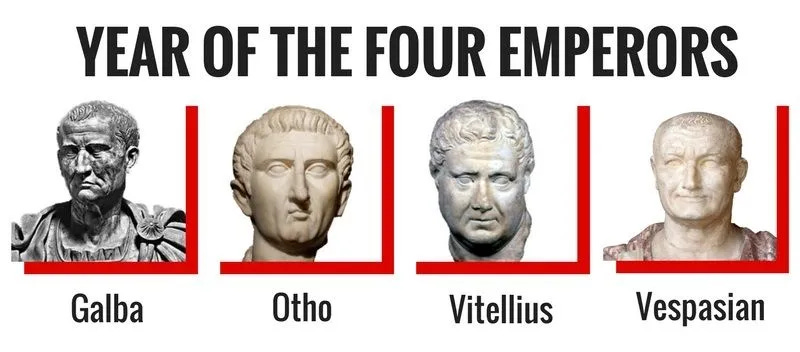The year 69 AD was the first civil war of the Roman Empire. Four emperors ruled in succession: Galba, Otho, Vitellius, and Vespasian. It was an important transition from the Julio-Claudians to the Flavian dynasty. There were several revolts and shifting alliances in Rome and its provinces.
The end of Nero’s reign, from 54 to 68, was marked by political posts such as the Pisonian conspiracy in 65. The Senate hated the emperor. In the winter of 67-68, Vindex, a legate, started a revolt against Nero. This is recounted in Plutarch.
In Rome, Nero was unable to resist Galba, and even considered fleeing to Egypt. Galba was backed by the Praetorian Guard. In 68, the Senate declared Nero an enemy of the state, and proclaimed Galba the new emperor. Nero committed suicide.
Galba
Galba was still in Spain when he heard news he had become emperor. He took a least a month to secure the Spanish provinces before leaving. Like Nero, Galba appointed weak leaders to the provinces. Anyone who had served under Nero was treated with suspicion. Galba even turned against some of his own early supporters.
Civil war brewed when, in 69, Roman legions in Germania refused to swear allegiance to Galba. One of Galba’s leading opponents was an ambitious nobleman named Otho. Otho bribed the Praetorian Guard, which was already unhappy with Galba. When Galba heard of the coup, he went to the streets to stabilize the situation. Galba couldn’t attract any supporters, and was killed in the Roman Forum by the Praetorian Guard.
Otho
On the day of Galba’s murder, the Senate recognized Otho as the new emperor. They saluted him, with relief. Although ambitious and greedy, Otho had no record of tyranny or cruelty. He was expected by the Romans to be a just ruler. But Otho’s efforts to restore peace were threatened by the rise of another imperial contender, a man named Vitellius, who declared himself emperor in Germania. Vitellius dispatched half of his army to march on Italy. In his command were some of Rome’s finest legions, veterans of the Germanic Wars.
Otho needed to avoid another civil war, and he sent emissaries to propose a peace plan. He offered to marry Vitellius’ daughter, to forge their political alliance. But it was too late. Vitellius was already heading toward Italy. After a series of minor victories, Otho was defeated at the First Battle of Bedriacum. Rather than escalate the conflict, Otho simply gave up the throne and committed suicide. He had been emperor for little more than three months by this time.
Vitellius
Upon hearing of Otho’s suicide, the Senate recognized Vitellius as the new emperor. The Romans were skeptical of their new leader from the beginning. They didn’t like when he chose the anniversary of the Battle of the Allia, a day of bad luck according to Roman superstition, to become the Pontifex Maximus. The omens seemed to be proved right.
Vitellius was a lavish emperor who quickly exhausted the treasury. Moneylenders began to angrily demand repayment, but the emperor punished those people with torture and execution. He eliminated every rival to the throne by violence, in the most cunning ways. The emperor would invite such individuals to his palace with promises of power, only to order their assassination.
Vespasian
The Romans grew wary of their tyrannical emperor Vitellius. Disgruntled legions across Egypt, Judea, and Syria proclaimed another man, Vespasian, as the new emperor. Vespasian had received a special command in Judea from Nero in 67, where he fought in the First Roman-Jewish War. He gained support from Syria’s governor, a man named Mucianus.
Vespasian travelled to Alexandria, where he was acclaimed emperor on July 1. This gave him control of Egypt’s vital grain supplies. His son, Titus, stayed behind in Judea to deal with the Jewish revolt. Vespasian’s forces managed to defeat those of his rival Vitellius at the Second Battle of Bedriacum.
Surrounded by enemies, the disgraced emperor Vitellius made a final attempt to win over the Romans, using bribes and promises of power. He tried to force alliances with neighboring tribes, but failed. Accompanied by Vestal Virgins, Vitellius sent a delegation to negotiate a truce. It was no use. Vitellius was forced into hiding. He made a final visit to the imperial palace, where he was caught and killed by Vespasian’s men, who also proceeded to burn down the Temple of Jupiter.
The next day, the Senate officially recognized Vespasian as the new emperor. It was December 21, 69. After this chaos, Vespasian finally brought some order to the Roman Empire. He founded the Flavian dynasty, which came after the Julio-Claudians. Vespasian died of natural causes in 79, and the dynasty he founded—the Flavians—ruled Rome peacefully from 69 to 96 AD.






